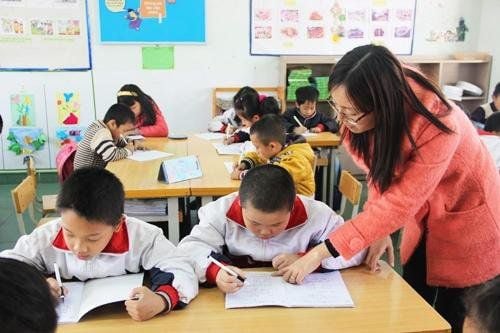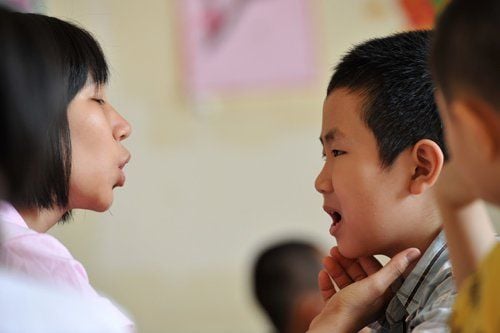This is an automatically translated article.
The article was consulted with Master, Doctor Doan Ngoc Quynh Tram - Pediatrician - Neonatologist - Department of Pediatrics - Neonatology - Vinmec Nha Trang International General Hospital.When a child is 2 to 4 years old and still does not know how to speak or is slow to speak, he or she says a few words, but is slower than his peers. This is often the case with parents whose children are slow to speak or have problems with language development. Unless parents observe some other problem of delayed development, parents can seek advice from specialist doctors. So what language problems are “normal” and what are not normal in speech and language development in 2- to 4-year-olds? The following article will provide useful information to help parents and caregivers early detect problems with language development and how to teach children language appropriately for children at this age.
No two children follow the same developmental timeline when learning to speak. There are many factors that influence a child's language ability, among which the child's innate ability plays the most important role, the other skills the child is learning at the same time, the child's ability to be exposed to language and how people react when children try to talk. However, there are some milestones common to all children that parents can track as their child begins to speak and identify children with language difficulties. For example, by the time your child turns 2, she'll probably string words together into short sentences, such as "Goodbye," and she'll be adding new words each month.
3 to 4 year olds are usually able to use longer sentences of 4 or 5 words. They string sentences together to talk about their activities or what the child did in kindergarten and the meaning of the sentences is quite understandable, even to outsiders. When a child learns to speak, he or she may face some difficulties. Here are some problems parents may notice and suggest ways to help.
1. Wrong pronunciation
Most children can correctly say all sounds by the age of 7. Before reaching this age, young children can mispronounce many words. However, they will gradually correct them when they are heard by adults.Because children learn to speak and pronounce according to what they hear, parents and relatives should be a good example. No matter how cute it is to find your child mispronouncing, use the right words when talking and emphasize words or sounds that are difficult for your child to say. Parents and relatives of the child also do not need to stress about carefully correcting the child's sentences, but simply repeating what the child said, but with the correct pronunciation. Focus on what your child says and correct it if he doesn't pronounce it correctly. Otherwise, children may feel frustrated and afraid to speak if they often find themselves mispronouncing.

2. Lying
The syllables that are most commonly stammered in 2 to 4 year olds are “l” and “n” or “s” and “x”. If your child hears this way, don't worry. Many children lisp while they are learning to speak and most will pronounce correctly by the time they are 7 years old. But parents should also pay more attention to their children if they continue to slur and their lisp becomes all too common by the time the child is 5 years old, especially for children who speak poorly and make other sound errors.In order to avoid the child's lisp, parents and those around them need to be aware of their own pronunciation. Many adults also often stutter syllables like children, so it is essential for children to adjust to a standard pronunciation pattern. Also, make sure the child can breathe comfortably while speaking and is treated for any allergies, colds or sinusitis so that he or she can breathe as naturally as possible through the nose with two lips. The open-mouth breathing position causes the tongue to lie flat and protrude. It is a position that helps with correct pronunciation.
Some parents may worry that the use of sippy cups will cause their child to stutter or make the condition worse, but this is not true. Diane Paul, director of clinical affairs in speech-language pathology for the American Speech-Language-Hearing Association, says, "Parents need not worry. There are no studies to support this. found an association between sippy cup use and oral motor development or speech problems.”

3. Stuttering
It is not uncommon for children to go through a phase of stuttering, especially when they are in a period of rapid growth in self-expression. But most children this age do not have persistent stuttering. At this age, they often hesitate or repeat entire words they just said. Stuttering occurs when a child's intellect develops faster than his verbal dexterity. Sometimes your child is so excited to tell you what he's thinking, or maybe he's just too tired, angry, or upset to say it out loud. Or the child may simply not have mastered the language learning process.How parents or those around them react to a stuttering child is important. Keep your voice relaxed and slow. There's no need to tell your child to slow down, just speak slowly and the child will follow the adult's lead. Besides, it is also necessary to maintain eye contact, smile and be patient. If a parent turns away and acts hastily, the child will feel pressured to stop the stuttering immediately and this can make the condition worse. If your baby's stuttering gets so bad that he has to strain his jaw or grimace to try to say the words, or if he repeats the sounds in words a lot (instead of repeating whole words), say Talk to your doctor or take your child to a doctor about speech problems.
4. Aphasia
Aphasia is a disorder caused by the nervous system that affects a child's ability to pronounce, syllables and words. This is not because the child has muscle weakness or paralysis, but because the brain has trouble communicating with the body parts needed to produce speech. Here are some signs that your child may have aphasia:The child may mispronounce the vowels in words The child may correctly pronounce a simple sound but mispronounce it at other times. Your baby may have trouble trying to coordinate her lips, tongue, or jaw to make sounds. Children may replace or remove difficult sounds and make vowel and consonant mistakes that make their sentences difficult to understand. Children may have more trouble with long phrases than with short ones. Your child's pitch, voice quality, speed, and loudness may not be the same as those of his or her peers. A child's understanding of language may be better than a child's ability to speak. Children under 3 years of age are rarely diagnosed with aphasia, but if parents feel concerned about their child, they should consult a speech-language pathologist.
If your child shows signs of aphasia in their 3rd or 4th year, it is important to seek professional help from a speech-language pathologist right away. Children with aphasia often need intensive treatment at an early age in order for the situation to improve for the better. Parents can also help their child by talking slowly, giving them time to respond, and following the recommendations of their home speech therapist.

5. When should a 2 to 4 year old child's language problems get help?
Sometimes minor language and speech problems go away as a child grows and becomes more proficient in speaking, but some problems require more attention. Your child's parent or preschool teacher may notice a problem. Children may be included in assessments and may be eligible for a speech and language early intervention program (usually coordinated through the public school system). Stress or dialect is not a speech sound disorder.It is important to seek help from a doctor or a speech-language pathologist if a child's parents notice any of the following:
By age 2, the child rarely tries to speak or make imitate others, do not respond when a parent or loved one calls their name, or appear uninterested in talking. By the end of a child's second year, she's still saying single words instead of two- to four-word sentences, using new words once and then not repeating them as often, or not asking or answering questions. simple questions parents ask Children frequently stop talking, constantly have trouble getting the words out, or simply give up and say "skip" a lot. Children drool when they mispronounce words. (This could be a sign of some kind of physical problem that requires medical attention.) The child has a history of ear infections along with speech problems. The period from 2 to 4 years old is a period of language and speech development of children. Children at this stage may also have some language problems such as slurred speech, stuttering, mispronunciation.... These are not too serious problems and can be corrected or limited. by the standards in language and speech of parents or family members. However, in some cases, such as aphasia in children, only early detection and timely intervention can completely eliminate the sequelae that may be encountered later in the child.
For children to be healthy and develop well, it is necessary to have a nutritious diet in terms of quantity and quality balance. If children are not provided with adequate and balanced nutrients, it will lead to diseases of excess or lack of nutrients, which adversely affect the comprehensive development of children in terms of physical, mental and motor skills.
Parents should supplement their children with supportive products containing lysine, essential micro-minerals and vitamins such as zinc, chromium, selenium, and B vitamins to help fully meet their child's nutritional needs. At the same time, these essential vitamins also support digestion, enhance nutrient absorption, help improve anorexia, and help children eat well.
Parents can learn more:
Signs of zinc deficiency in children
Micronutrient deficiency and failure to gain weight in children
Please dial HOTLINE for more information or register for an appointment HERE. Download MyVinmec app to make appointments faster and to manage your bookings easily.
References: babycenter.com, mottchildren.org













